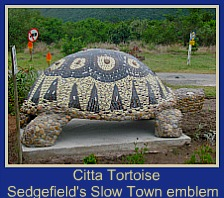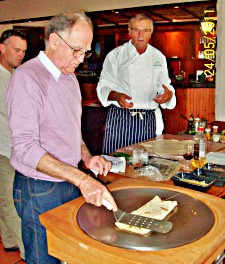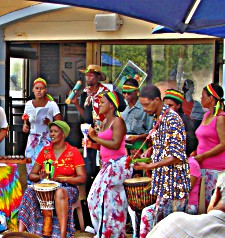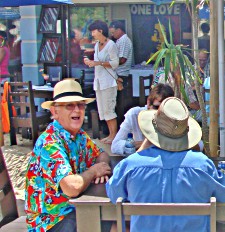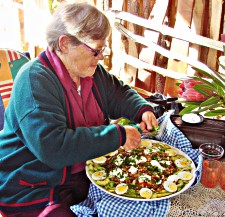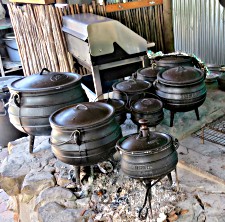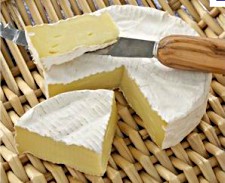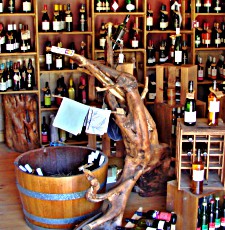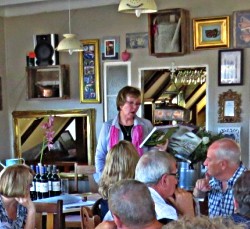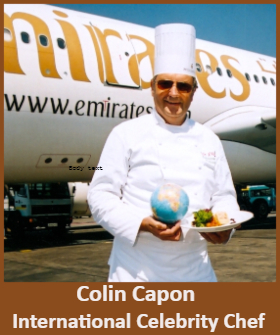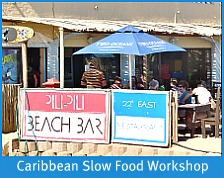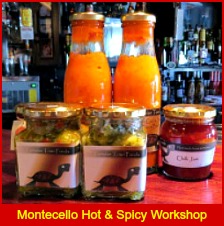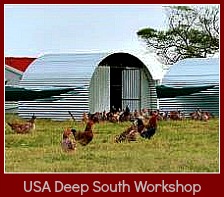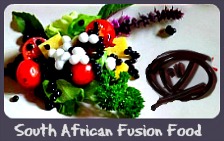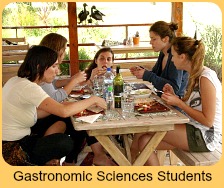Moroccan Theme
Slow Food Workshop
A Moroccan theme Slow Food workshop was held at the Cutty Sark Restaurant at Pine Lake Marina in April. Overlooking the beautiful Swartvlei Lake on a calm Autumn day, with the sandy beach below us, it could have been Morocco!

Moroccan Culture and Food
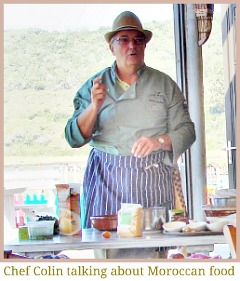
Colin started the Moroccan theme workshop by talking about Morocco saying it is an exciting place to visit with its bazaars and markets and beautiful foods that have been influenced through centuries by interaction with other cultures and countries.
He mentioned that Moroccans have communal ovens where people can leave their tagines to cook slowly under supervised care and fetch them at the end of the day.
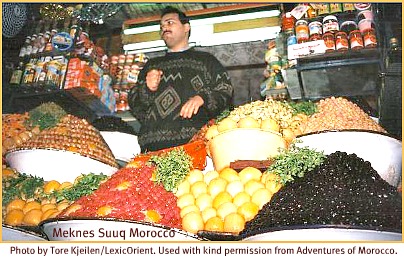
He commented that the British introduced the Moroccans to tea – but they have their own take on it – green tea with mint.
Common meats are beef, lamb, chicken, rabbit, camel and seafood.
Characteristic flavourings include lemon pickle, unrefined olive oil, dried fruits and spices, the most popular being cinnamon, nutmeg, cumin, coriander, paprika, ginger and saffron.
A popular Moroccan theme dish is Spiced Lamb with prunes and apricots.
Moroccan Theme Main Meal
Like us at the Moroccan theme workshop, the main meal in Morocco is eaten at midday often starting off with hot and cold salads.
Followed by a tagine - named after the earthenware pot in which it is cooked - a mixture similar to a stew in our terms, served with couscous.
Bread is eaten with every meal. Dessert is frequently seasonal fruit and sweet mint tea concludes the meal.
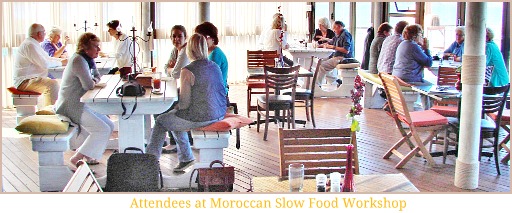
Couscous is semolina, a healthy, versatile grain. It can be used in savoury and sweet dishes. Eaten with chopped dates and hot milk, it’s a delicious porridge.
Adding several of the following ingredients makes it into a great accompaniment for a tagine – carrots, ginger, garlic, red onion, coriander, parsley, salted lemons, mint, dried fruit, olive oil. It can be eaten cold as a salad.
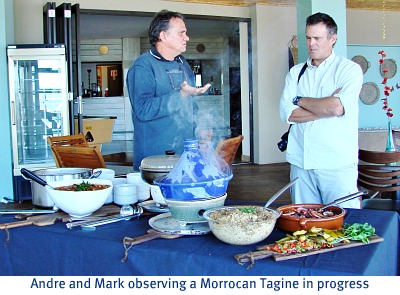
Colin has said we are doing these various themes so we can research the foods of different countries and get to use and understand how combining herbs and spices with different ways of cooking meats and vegetables create vastly different flavours from what we’re used to.
Experimental cooking can be an exciting journey for food lovers and discovering the delicious cuisine of other countries and cultures is part of what Sedgefield Slow Food Convivium is all about. We pick up invaluable tips from Colin as he demonstrates some aspect of cooking relating to the theme of each workshop.
Slow Food Ethics-Real Food
The Slow Food movement is a global grassroots organisation that in the words of its founder, Carlo Patrini aims to "unite the pleasure of food with responsibility, sustainability and harmony with nature".

Aware of this, Colin invited Lizelle of “Your Green Box” to talk at our Moroccan theme workshop. Lizelle introduced the subject of Green Living asking us to consider what kind of world we’re leaving to future generations.
She suggested that we ought to try and buy local fruit and vegetables that are in season, and to educate ourselves about the foods we’re eating.
NB. The Green Box website is no longer operational.
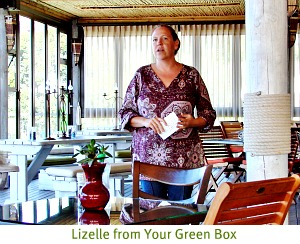
Real food is food grown in good soil, free of preservatives and additives eaten fresh, preferably raw more often than cooked so that your body receives all the nutrients undiminished by age (read storage and transport) and cooking.
We are what we eat though many people don’t make that connection!
Crop Poisons & GMO's
Toxins on vegetables grown with fertilizers and pesticides are potential endocrine disrupters, that means they affect the hormonal glands of the body such as the thyroid, adrenals, pituitary, ovaries, testes, pancreas, etc.
In nature, bees too, need access to pesticide-free food, water and shelter – their colonies are collapsing because of the huge commercial use of insecticides and pesticides. All plants and crops require pollination to propagate, a role that insects and bees fulfil.
Meanwhile the dangers of genetically modified crops are starting to surface. With superweeds and superbugs emerging all over the world, Monsanto’s RoundUp Ready strategy of stacking seeds with herbicide-resistant traits is fast coming apart. Now Dow Chemicals and the USDA(the United States Department of Agriculture) hope to quietly approve a new genetically engineered seed line that basically swaps RoundUp (glyphosate) out for an even worse weedkiller (2,4-D).
No other African country grows GM crops on a commercial basis, although some have experimental field trials. Sources vary, but estimates are that South Africa plants 40% of its maize crop to GM varieties, 60% of its soya, and 80% of its cotton and we import GM maize and soya from Argentina and the USA mainly for animal feed, but whether you like it or not, you are probably eating GM food. (Biophile Magazine – Genetic Engineering –Issue 14)
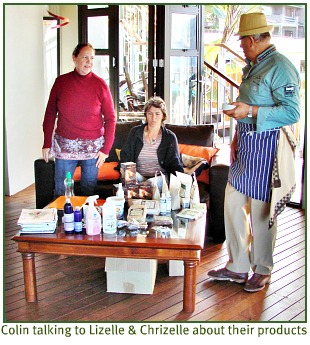
Consequently around 70% of our processed foods bought off supermarket shelves including baby foods contain these products. We, the general public, are unaware that the soy and corn syrup products in our fast foods are largely of the genetically modified kind as it is not specified on the labels.
80% of antibiotics in South Africa are used on animals that people eat. Add to that the knock-on effects of the hormones they are injected with. Part if not all livestock feed is genetically modified grains of corn, alfalfa and soybeans. Increasingly, it would be wise choice to choose certified free-range meat.
All things considered, our bodies are being bombarded on too many fronts with substances they cannot assimilate. With cancer diagnoses increasing at an alarming rate even amongst children, neither the Department of Agriculture nor the Department of Health seem willing to tie it to what is being done to our food and our environment.
The Hoax of Bottled Water
Then there is the hoax of bottled water! 17 million barrels of oil are used in the production of water bottles annually. It takes 3 times the amount of water to make the bottle as it does to fill it.

Only 1 in 5 water bottles are recycled. The other 4 bottles contribute to polluting our waterways and oceans and filling our landfills with 4 billion pounds of oil-based plastics annually that are going to take 1000’s of years to degrade.
40% of bottled water is tap water and 22% of tested bottled water contained contaminants above the level of that found in municipal treated tap water.
It’s a multi-billion dollar industry that is costing our planet dearly. Yet Nestle launched a campaign that said “Bottled water is the most environmentally responsible product in the world.” And Pepsi said “The biggest enemy is tap-water.”
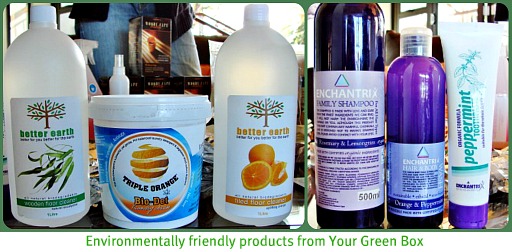
Big multi-national companies try to blindside us with their sophisticated advertising campaigns but consumers need to get smarter and to stop being intimidated with "fear" tactics!
We need to realise that these companies’ hearts are in their pockets and they are pathological liars when it comes to protecting their bottom line. See this short video clip here.
To read about this in more detail click here.
Other Concerns
What about personal products - ever looked at the ingredients in your shampoo or sunscreen or makeup? Consider this, should you be putting on your skin what you can’t put into your mouth?
Many ingredients in skin care products cause unpleasant reactions like irritation, rashes and worse.
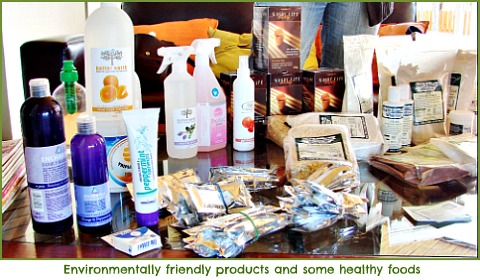
Ever notice that your face, on which you lavish so many creams and lotions looks older than the rest of your skin? Hmmm - makes you think, doesn’t it?
Our indoor air quality is another health consideration. It could be 3 to 4 times worse than the air outdoors because of the chemicals in the cleaning products we use, in the varnish and paint finishes in rooms and on furniture, and in the synthetic fibres of our carpets and other materials we have in our homes.
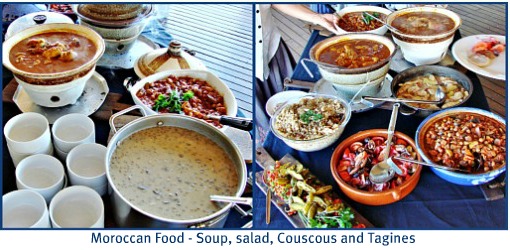
The increasing number of allergies that children and adults are suffering from is an indication that they are being affected by pathogens their bodies cannot handle.
Yet, there are several comprehensive ranges of environmentally friendly products on the market now and many simple old time cleaning agents like bicarbonate of soda and vinegar can do just as well without causing detrimental side effects to pets or people.
Many issues arising from these topics continued to be discussed during our Moroccan theme lunch.

Delectable Zee who agreed to host the Moroccan theme Workshop has just contracted to run Cutty Sark for the next while. She produced a number of fine dishes including a very tasty Lentil and mushroom soup to start off with.
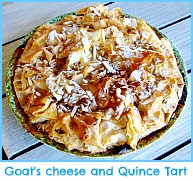
This was followed by the main course of several tagines one of pork, calamari and chickpeas (also hers), 2 vegetatarian ones, and 3 different kinds of chicken, two couscous dishes, a jalepeno and mixed red and green peppers salad (also Zee’s), tomato, black grape and nut salad, and carrot salad.

A dessert of Goat’s cheese and quince tart made with filo pastry and decorated with flaked almonds made by Chef Colin concluded the Moroccan theme meal.
The table talk was lively though the lunch was enjoyed leisurely and everyone agreed that Moroccan cuisine is delicious! Thanks to all who contributed dishes and to those who attended.
NB. The Restaurant has been replaced by Pine Vibe Sport/Cocktail & Coffee Bar that is hailed as a"Husband Day Care Centre"

Related Links


The Culture Trip - Morocco provides articles on the best food, art,culture and travel experiences to be found in Morocco.

This informative and fascinating Blog about Voluntary Simplicity will be an eye-opener to some people. In Shirley’s own words...Actually, choosing to live “consciously and deliberately” will give you freedom… more quality time....more discretionary money....and more appreciation and enjoyment of every aspect of your life.
- Discover Sedgefield
- Slow Food
- Moroccan Theme

